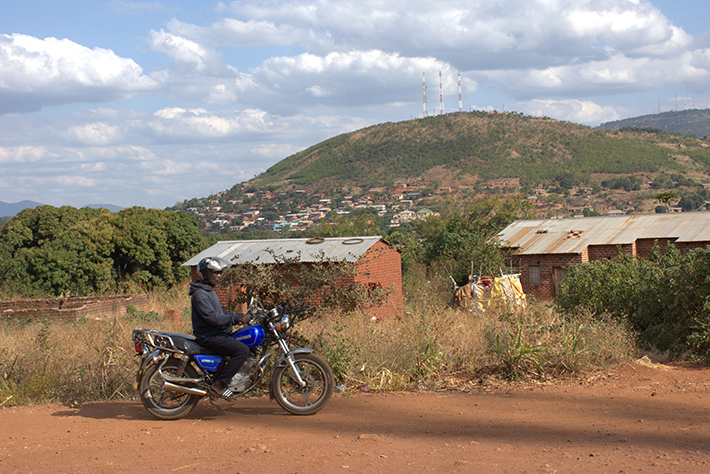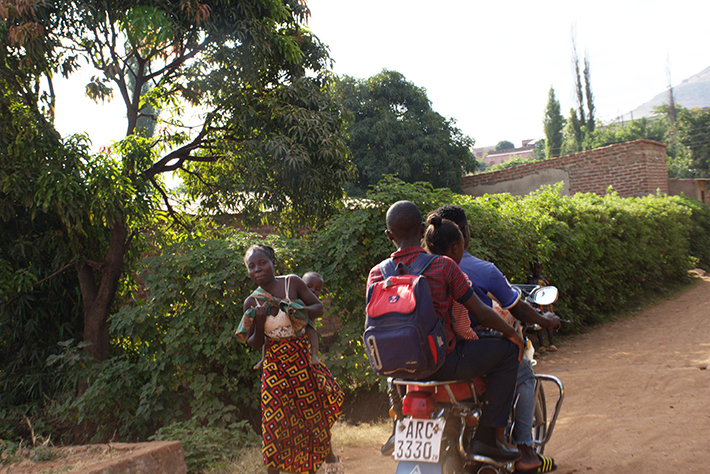|
||||||||||
| Home Top News Economy/Tech Culture/Sports China in Foreign Eyes Green Development Videos Intangible Cultural Heritages |
|
||||||||||
| Home Top News Economy/Tech Culture/Sports China in Foreign Eyes Green Development Videos Intangible Cultural Heritages |
| ChinAfrica |
| Wheels of Opportunity |
| Chinese motorcycles create job opportunities in Zambia |
| By Derrick Silimina | VOL. 17 November 2025 ·2025-11-05 |

A motorbike rider on a Chinese-made bike looks for passengers during rush hour (COURTESY)
In the busy streets of Lusaka, Zambia’s capital, Joel Kangwa fired up his red Haojue. It is not just a motorbike. It is the reason he wakes up each morning with purpose. He kicked the starter and the engine responded with a low growl.
“Working as a courier on my motorbike is a dream come true. I now earn more than double what I used to make as a salesman in the industrial area,” he said.
As Kangwa begins his first trip, the breeze rushing past his helmet creates a smooth rhythm that evokes a sense of purpose and vitality. It highlights how essential his motorbike is to completing his daily deliveries.
Kangwa, 30, took a job as a delivery rider two years ago. Thanks to this work, he was able to buy a fuel-efficient Chinese motorbike that is easy to maintain. This shows how gig work helped him to climb economically and build assets.
“My flexible working hours and lack of direct supervision give me a sense of independence. The steady income improves my economic stability and brings a sense of purpose and well-being,” he said.
Positive results
The use of Chinese-made motorbikes in the Southern African country provides young people with vital livelihood opportunities amid high unemployment. By registering on courier platforms, riders earn income delivering various goods such as food, flowers, household appliances and parcels, receiving payment for each delivery.
This delivery business not only boosts economic activity nationwide, but also provides flexible jobs for young people with few opportunities. It helps to reduce poverty and build economic resilience. “I do not have to look for work anymore. I am glad to use my bike to earn a living because this job lets me pay rent, feed my family and save some money,” said Kangwa.
Joshua Mwanza, with only a month in the transport business, is already seeing positive results using his Jialing motorbike at Kapata Bus Station in Chipata District, east Zambia. This quick progress shows how fast new entrants in the transport sector can benefit and establish themselves, especially with reliable Chinese motorbikes that enable efficient passenger transport.
“After finishing tertiary education, I tried to find a job but had no luck. I saw the transport business growing and gave it a shot after buying a second-hand Jialing motorbike,” Mwanza explained.
For George Chirwa, a young aspiring motorcycle mechanic, the widespread availability of spare parts especially from Chinese manufacturers has made maintenance and customisation easier. This sparked his idea to open a garage on Lusaka’s Lumumba Road where he hopes to tap into the rising demand for repairs and customisation.
At Chirwa’s workshop, the clatter of tools, the sharp ping of a dropped bolt, and the soft hiss of a tire being re-inflated form the daily soundtrack of his work. Surrounded by colourful motorcycles, his careful inspection of worn brake pads, a kinked throttle cable and a loose chain reflects his experienced approach and deep understanding of motorcycle mechanics.
“Nowadays, I don’t worry about bills or the high cost of living in Lusaka. With the strong demand for bike repairs, I earn a stable daily income,” said Chirwa who specialises in repairing Chinese motorbikes such as Lifan, Haojue, Xianfeng, and Jialing among other brands.

Joshua Mwanza rides his second hand Chinese motorbike to ferry passengers from Chipata town centre (COURTESY)
Role of Chinese manufacturing
The use of Chinese-made motorcycles by individuals like Kangwa and Mwanza, along with Chirwa’s expertise in repairing these brands, highlights the tangible impact of Chinese manufacturing on mobility and economic participation in Zambia. The ease of movement and the availability of repair services for these bikes support local economic activity and employment, showing how Chinese products contribute to the welfare of local communities.
As Chinese investment in motorbike assembly plants and production increases across Africa including Zambia, some of these efforts, such as agreements signed during the recent Western China International Fair, are expected to support more localised production and create additional employment opportunities in the region.
Many of these vehicles are produced in Chongqing, a global centre for motorcycle manufacturing, showing China’s key role in offering low-cost and accessible transport across Africa.
“Africa is one of our most important overseas markets. In the first quarter of this year alone, we exported more than 130,000 motorcycles worth nearly $90 million,” said Zhou Chun, manager of the International Department at Zonsen Motorcycle.
Chongqing’s export of over 5 million motorcycles shows strong growth and points to a trade relationship that could reshape local markets and increase motorcycle use in Zambia and beyond.
Deals worth 1.65 billion yuan ($232 million) signed between Chongqing enterprises and African countries like Rwanda and Kenya during the Western China International Fair show the deepening economic relationship between China and Africa. The agreements focus on motorcycle and car assembly and spare parts production, reflecting China’s strategic push into Africa’s automotive industry.
Such collaborations exemplify how China’s involvement is shaping vehicle production and distribution across Africa while reflecting broader trends of growing Chinese industrial presence on the continent.
For this reason, a high-level delegation from a Chinese company showed interest in setting up a motorcycle assembly plant in Zambia’s Kapiri Mposhi District, a strategic step aimed at boosting local manufacturing and improving supply chain integration nationwide.
The interest in Kapiri Mposhi is largely driven by its strategic location. The district serves as a critical transportation and logistics hub situated at the crossroads of two major railway lines, the Tanzania-Zambia Railway and Zambia Railways.
Munyeke highlighted the multifaceted benefits of establishing the motorcycle plant including direct employment in manufacturing and indirect roles in supporting sectors like logistics, maintenance and retail, adding that the plant is expected to improve transportation affordability in the district. “We anticipate the motorcycle plant will elevate the district’s status as an industrial and innovative hub and boost our socio-economic emancipation.”
| About Us | Contact Us | Advertise with Us | Subscribe |
| Copyright Beijing Review All rights reserved 京ICP备08005356号-5 京公网安备110102005860号 |